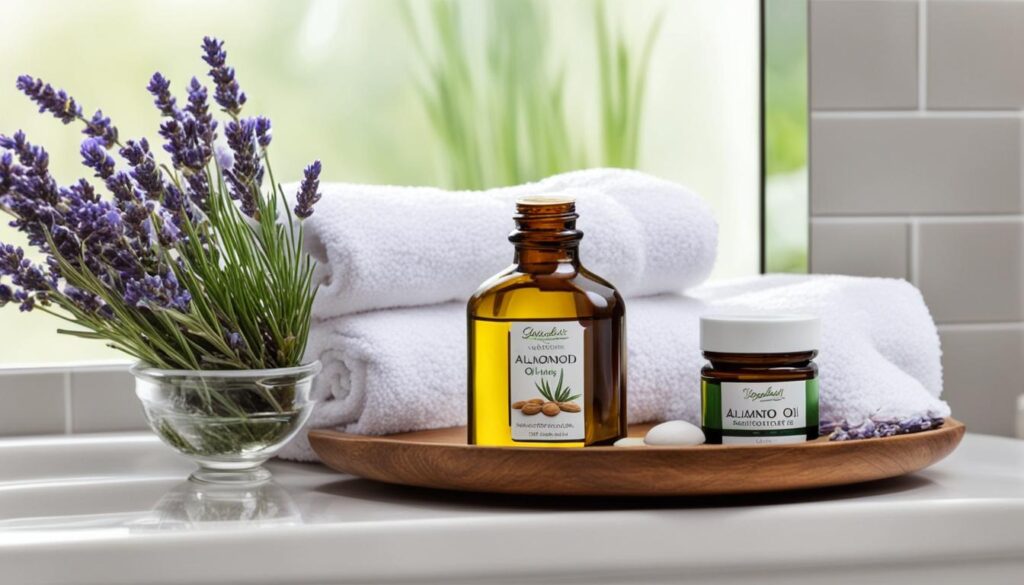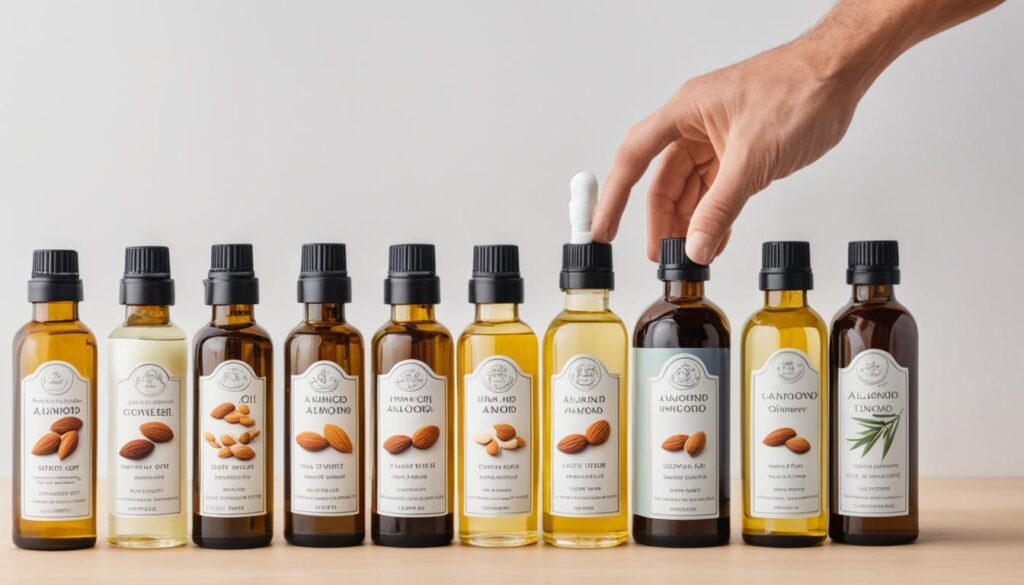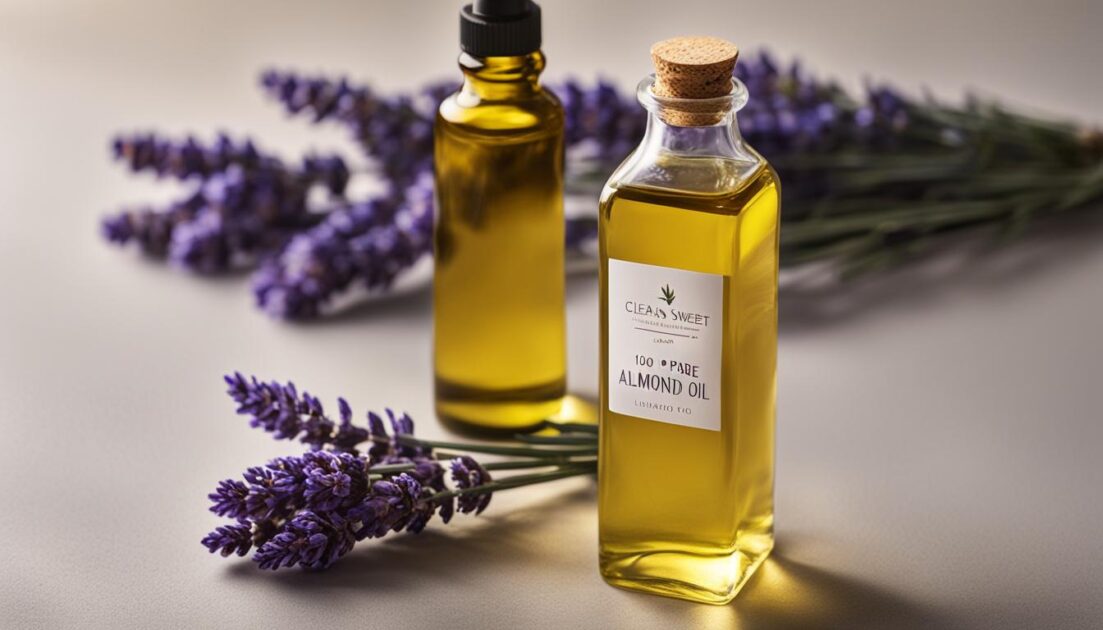Welcome to my article on the uses and benefits of sweet almond oil. This versatile oil has gained popularity in recent years for its numerous applications in skincare, haircare, cooking, and more. In this article, I will discuss the various ways you can incorporate sweet almond oil into your daily routine and reap its many benefits for your skin, hair, and overall well-being. From nourishing your skin to adding flavor to your favorite dishes, sweet almond oil is a valuable addition to any lifestyle.
Key Takeaways:
- Discover the benefits of sweet almond oil for skin, hair, and overall well-being.
- Learn how to incorporate sweet almond oil into your beauty and health routine.
- Explore the culinary uses of sweet almond oil and try out new recipes.
- Understand the properties and key components of sweet almond oil and their impact on your skin and hair.
- Get expert tips and cautions for using sweet almond oil safely and effectively.
The History and Origin of Almond Oil

Almond oil has a rich history and can be traced back to its origins in the Middle East. The cultivation and use of almonds for oil production date back thousands of years, and this versatile oil has been valued for its various applications in different cultures and traditions.
In modern times, California has emerged as the largest producer of almonds globally, contributing significantly to the production of almond oil.
Almond oil is extracted through a process known as cold-pressing, which involves pressing almonds at room temperature to retain their nutrients and delicate flavor. This method ensures that the oil maintains its natural properties and purity.
It is important to note that there are different types of almond oil available, each with its own distinct qualities and uses. The two main types are bitter almond oil and sweet almond oil.
Bitter almond oil, derived from bitter almonds, is known for its strong scent and is often used in soaps, aromatherapy, and massage therapy.
Sweet almond oil, on the other hand, is extracted from sweet almonds and is widely used in skincare and haircare products due to its nourishing and moisturizing properties.
Understanding the history and origin of almond oil provides valuable insights into its cultural significance and the diverse ways in which it has been utilized throughout history. This knowledge enhances our appreciation for this natural and versatile oil.
Properties and Key Components of Sweet Almond Oil

Sweet almond oil is highly regarded for its beneficial properties and rich composition. It is packed with antioxidants, vitamins, and minerals, making it an excellent addition to skincare and haircare routines.
The antioxidants present in sweet almond oil help protect the skin from free radical damage, keeping it healthy and youthful-looking. These antioxidants also promote overall skin health and can help reduce inflammation and irritation.
One of the key components of sweet almond oil is vitamin E. Vitamin E is known for its nourishing and hydrating properties. It helps to moisturize the skin, keeping it soft and supple. Vitamin E is also a potent antioxidant that helps fight against free radicals, protecting the skin from damage caused by environmental factors.
In addition to antioxidants and vitamins, sweet almond oil is also rich in fatty acids. These fatty acids contribute to the oil’s moisturizing and emollient properties, making it an excellent choice for hydrating and soothing dry or irritated skin. They help lock in moisture, preventing water loss and keeping the skin hydrated for longer periods of time.
Overall, the properties and key components of sweet almond oil make it a powerful ingredient for improving skin health and achieving a radiant complexion. Its antioxidant content, along with the nourishing vitamins and moisturizing fatty acids, work together to promote healthy, glowing skin.
Benefits of Antioxidants in Almond Oil:
- Help protect the skin from free radical damage
- Promote overall skin health
- Reduce inflammation and irritation
Vitamins in Sweet Almond Oil:
- Vitamin E: Nourishes and hydrates the skin
Key Components of Sweet Almond Oil:
- Fatty acids: Provide moisturizing and emollient properties
Culinary Uses of Sweet Almond Oil

Sweet almond oil is not only beneficial for skincare and haircare but also has culinary applications. It can be used in various cooking methods and adds a mild, nutty flavor to dishes.
When it comes to cooking with almond oil, there are several ways to incorporate it into your recipes. Here are some culinary uses of sweet almond oil:
- Finishing Oil: Sweet almond oil can be used as a finishing oil to enhance the flavor of dishes. Drizzle it over cooked vegetables, pasta, or grilled meats to add a nutty aroma.
- Salad Dressings: Incorporate sweet almond oil into your homemade salad dressings to give them a unique taste. Combine it with vinegar or citrus juice, herbs, and seasonings for a delightful vinaigrette.
- Baking: Replace other oils or butter with sweet almond oil in low-heat baking recipes. It can be used in cakes, cookies, muffins, and bread for a subtle nutty flavor.
- Sautéing: Use sweet almond oil for sautéing vegetables or frying foods at low to medium heat. Its mild flavor pairs well with a variety of ingredients.
Here are a few recipes that showcase the versatility of sweet almond oil:
Almond-Crusted Fish: Coat fish fillets with a mixture of sweet almond oil, crushed almonds, breadcrumbs, and seasonings. Bake or pan-fry for a crispy and flavorful crust.
Almond-Flour Baked Goods: Replace regular flour with almond flour and use sweet almond oil as a healthier alternative in baked goods like cookies, cakes, and pancakes.
Almond Oil-Infused Pesto: Blend fresh basil, garlic, Parmesan cheese, pine nuts, and sweet almond oil to create a delicious and aromatic almond oil-infused pesto sauce.
When using sweet almond oil in cooking, it is important to note that high-heat cooking methods should be avoided, as they can degrade the delicate flavor and nutritional value of the oil. Instead, focus on incorporating it in recipes that require low to medium heat.
By experimenting with sweet almond oil in your cooking, you can add a touch of nuttiness to your dishes and explore new flavors and culinary possibilities.
Personal Care and Household Uses of Sweet Almond Oil

Aside from its culinary applications, sweet almond oil offers a multitude of uses in personal care and around the house. This versatile oil is a common ingredient in skincare and haircare products, delivering nourishing and moisturizing benefits.
When it comes to personal care, sweet almond oil is often found in moisturizers, cleansers, shampoos, and conditioners. Its moisturizing and emollient properties make it an excellent choice for hydrating and softening both the skin and hair.
For skincare, sweet almond oil can be applied topically to hydrate dry or irritated skin. Its light texture allows it to penetrate deeply, leaving the skin feeling soft and supple. It can also help improve the appearance of scars, wrinkles, and other blemishes, promoting a more youthful complexion.
In haircare, sweet almond oil can be used as a leave-in conditioner or added to shampoo and conditioner for added hydration. It helps to moisturize and strengthen the hair, leaving it shiny, smooth, and manageable. Additionally, it can help soothe the scalp and promote healthy hair growth.
But the uses of sweet almond oil don’t stop there. This versatile oil can also be incorporated into various household applications. It can be used as a natural makeup remover, gently and effectively eliminating makeup without harsh chemicals. Additionally, sweet almond oil can be utilized as a massage oil, providing relaxation and relieving muscle tension.
Furthermore, sweet almond oil can find its place in simple household tasks. It can be used to polish wood furniture, restoring its natural shine and protecting it from drying out. In addition, its lubricating properties can be helpful for squeaky hinges or any other household items that require smooth movement.
With sweet almond oil’s numerous personal care and household uses, it is truly a must-have ingredient for anyone seeking natural and versatile solutions.
Here is a table summarizing the personal care and household uses of sweet almond oil:
| Personal Care Uses | Household Uses |
|---|---|
| Moisturizing and softening the skin | Polishing wood furniture |
| Hydrating and strengthening the hair | Lubricating squeaky hinges |
| Improving the appearance of scars and blemishes | – |
| Makeup removal | – |
| Relaxing massage oil | – |
As you can see, sweet almond oil has a variety of uses beyond personal care, making it a versatile and valuable addition to your daily routine.
Benefits and Application of Sweet Almond Oil

Sweet almond oil offers numerous benefits for both skincare and haircare. Its rich composition of antioxidants, vitamins, and minerals makes it a versatile ingredient with multiple applications. It effectively moisturizes and nourishes the skin, reduces the appearance of scars and wrinkles, soothes dry or irritated skin, and improves overall complexion and skin tone.
For skincare, sweet almond oil can be applied topically or used as a carrier oil for essential oils in DIY skincare recipes. Its lightweight texture and non-greasy feel make it suitable for all skin types. In haircare, it helps moisturize and strengthen the hair, promotes hair growth, reduces frizz, and improves scalp health.
“The benefits of sweet almond oil are remarkable. It’s a natural, versatile ingredient that can enhance the health and appearance of both your skin and hair.”
When using sweet almond oil for skincare, it can be applied directly to the skin as a moisturizer or incorporated into homemade skincare products such as body oils, creams, or serums. For haircare, sweet almond oil can be used as a hair mask, leave-in conditioner, or added to shampoos and conditioners.
Skincare Benefits and Application
- Moisturizes and nourishes the skin
- Reduces the appearance of scars and wrinkles
- Soothes dry or irritated skin
- Improves overall complexion and skin tone
Haircare Benefits and Application
- Moisturizes and strengthens the hair
- Promotes hair growth
- Reduces frizz
- Improves scalp health
When using sweet almond oil for skincare or haircare, it is important to perform a patch test first to check for any allergic reactions or sensitivities. Additionally, ensure that the sweet almond oil is pure and of high quality. Proper storage in a cool, dark place will help maintain its freshness and effectiveness.
Sweet almond oil offers multiple benefits for both skincare and haircare.
Usage Tips and Cautions for Sweet Almond Oil
When it comes to using sweet almond oil, there are some important tips and precautions to keep in mind to ensure optimal results and safety. Here are some key points to consider:
- Perform a patch test: Before applying sweet almond oil to a larger area of your skin, it’s recommended to perform a patch test. Apply a small amount of the oil to a small, discreet area and wait for 24 hours to check for any allergic reactions or sensitivities.
- Proper storage: To maintain the freshness and quality of your sweet almond oil, store it in a cool, dark place. Exposure to light and heat can cause the oil to go rancid, reducing its effectiveness.
- Mixing with other ingredients: Sweet almond oil can be combined with other ingredients such as essential oils for additional benefits. However, it’s important to dilute essential oils properly and follow recommended guidelines for safe usage.
- Avoid if you have nut allergies: Individuals with nut allergies should avoid using sweet almond oil, as it may trigger an allergic reaction. If you have any known allergies, it’s best to consult with a healthcare professional before incorporating almond oil into your routine.
By following these tips and precautions, you can use sweet almond oil safely and effectively in your skincare, haircare, or other personal care routines.
Selecting the Best Quality Sweet Almond Oil

To ensure the best quality and effectiveness, it is important to select high-quality sweet almond oil. When choosing almond oil, there are several factors to consider and specific qualities to look for. Here are some tips to help you select the best sweet almond oil for your needs:
- Look for purity and organic certification: It is advisable to choose almond oil that is labeled as pure or organic. This ensures that the oil is free from additives, chemicals, and contaminants.
- Check the extraction method: Cold-pressed almond oil is considered to be of superior quality. This extraction method involves pressing the almonds at room temperature, which helps retain more of the oil’s nutrients and beneficial properties.
- Read reviews and seek recommendations: Before making a purchase, read reviews from other customers or seek recommendations from trusted sources. This can provide valuable insights into the quality and effectiveness of different almond oil brands.
- Choose reputable brands or suppliers: When buying almond oil, opt for reputable and reliable brands or suppliers. This ensures that you are getting a genuine and high-quality product.
By following these tips, you can select sweet almond oil that is pure, organic, and of the highest quality, ensuring that you reap the maximum benefits for your skin, hair, and overall well-being.
| Qualities to Look for in Sweet Almond Oil | Qualities to Avoid in Sweet Almond Oil |
|---|---|
| Pure and organic certification | Additives and chemicals |
| Cold-pressed extraction method | Heat-processed or chemically extracted |
| Positive customer reviews and recommendations | Negative or unreliable reputation |
| Reputable brands or suppliers | Unknown or unverified sources |
Note: The table above highlights the qualities to look for in high-quality sweet almond oil and the qualities to avoid.
Proper Storage of Sweet Almond Oil
To ensure the longevity and quality of sweet almond oil, it is crucial to store it correctly. Proper storage helps maintain the oil’s freshness and preserves its beneficial properties. Follow these tips to store almond oil effectively:
- Keep it cool and dark: Store almond oil in a cool and dark place, away from direct sunlight, as exposure to light can cause degradation.
- Avoid heat sources: Keep almond oil away from heat sources, such as stoves or radiators, as heat can also affect the oil’s quality.
- Tightly seal the container: Ensure the almond oil container is tightly sealed to prevent air and moisture from entering, as these can impact the oil’s longevity and freshness.
- Check the expiration date: Always check the expiration date or best before date on the almond oil bottle and use it within the specified period to ensure its freshness and effectiveness.
By storing sweet almond oil properly, you can extend its shelf life and preserve its quality for optimal use.
Potential Side Effects and Precautions of Sweet Almond Oil
While sweet almond oil is generally safe for most individuals, it is important to be aware of certain precautions and potential side effects. Here are some important points to consider:
Allergic Reactions:
Sweet almond oil is derived from almonds, which are tree nuts. Therefore, individuals with nut allergies should exercise caution when using almond oil, as it may trigger an allergic reaction. It is recommended to perform a patch test before applying almond oil to a larger area of the skin to check for any allergic reactions or sensitivities.
Acne-Prone Skin:
If you have acne-prone skin, it is advisable to avoid applying almond oil directly to the face or skin. Almond oil has a moderately high comedogenic rating, which means it has the potential to clog pores. Using almond oil on acne-prone skin may worsen acne symptoms and lead to breakouts. It is best to consult with a dermatologist or skincare professional for suitable skincare alternatives for acne-prone skin.
Performing a Patch Test:
Before incorporating sweet almond oil into your skincare or haircare routine, it is recommended to perform a patch test. Apply a small amount of almond oil to a discreet area of skin, such as the inner forearm. Leave it on for 24-48 hours and monitor for any signs of irritation or discomfort. If redness, itching, or swelling occurs, it is best to discontinue use immediately and consult with a healthcare professional.
Consulting with a Professional:
It is always advisable to consult with a healthcare professional, dermatologist, or qualified aromatherapist before using sweet almond oil, especially if you have pre-existing skin conditions, allergies, or are pregnant or breastfeeding. They can provide personalized advice, recommend suitable alternatives, and guide you on the safe and effective use of sweet almond oil.
Summary:
Sweet almond oil has the potential to cause allergic reactions in individuals with nut allergies and may worsen acne symptoms in acne-prone skin. Performing a patch test before use and consulting with a healthcare professional are important precautions to ensure safe and suitable usage of sweet almond oil.
Sweet Almond Oil in Scientific Research
Several scientific studies have explored the potential benefits and effects of sweet almond oil. Research has shown that almond oil possesses antioxidant, anti-inflammatory, and antimicrobial properties. Studies have demonstrated its efficacy in improving skin moisture, reducing the appearance of scars, preventing stretch marks, and protecting against sun damage. Additionally, research suggests that almond oil may have positive effects on hair growth, scalp health, and overall hair condition. While more research is needed to fully understand the extent of these benefits, scientific studies provide valuable insights into the potential uses and effects of sweet almond oil.
Incorporating Sweet Almond Oil into Your Beauty and Health Routine
With its numerous uses and benefits, sweet almond oil can be a valuable addition to your beauty and health routine. Incorporating almond oil into your daily regimen can help you enhance your natural beauty and experience the potential benefits it offers for your skin, hair, and overall well-being.
One of the ways to incorporate sweet almond oil into your routine is by using it in your skincare regimen. Almond oil can be used as a moisturizer, helping to hydrate and nourish your skin. You can apply it directly to your skin or mix it with your favorite moisturizer for an extra boost of hydration. Almond oil’s antioxidant properties can also help protect your skin from free radicals and environmental damage.
In addition to skincare, sweet almond oil can also be used for haircare. It can help moisturize and strengthen your hair, reduce frizz, and promote hair growth. You can use almond oil as a hair mask, applying it to your hair and scalp, or mix it with your conditioner for added benefits. The lightweight texture of almond oil makes it suitable for all hair types.
When incorporating sweet almond oil into your routine, it’s important to follow a few tips and tricks for optimal results. Perform a patch test before using almond oil on a larger area of your skin or hair to check for any allergic reactions or sensitivities. Choose high-quality almond oil and store it properly to maintain its freshness and efficacy. And most importantly, enjoy the process of experimenting with different DIY recipes and finding what works best for you.
FAQ
What are the uses and benefits of sweet almond oil?
Sweet almond oil can be used for skincare, haircare, culinary purposes, personal care products, and household applications. It provides various benefits such as moisturizing the skin, improving hair health, adding flavor to dishes, and more.
How can sweet almond oil be used for skincare?
Sweet almond oil can be used topically to moisturize the skin, reduce the appearance of scars and wrinkles, soothe dry or irritated skin, and improve overall complexion and skin tone. It can be used as a standalone oil or as a carrier oil with essential oils in DIY skincare recipes.
Can sweet almond oil be used for cooking?
Yes, sweet almond oil has culinary applications. It can be used in various cooking methods and adds a mild, nutty flavor to dishes. It is commonly used as a finishing oil in salad dressings or drizzled over cooked dishes to enhance their taste.
How can sweet almond oil be used for haircare?
Sweet almond oil can moisturize and strengthen hair, promote hair growth, reduce frizz, and improve scalp health. It can be used as a hair mask, leave-in conditioner, or added to shampoos and conditioners. It is suitable for all hair types.
Are there any precautions to consider when using sweet almond oil?
It is recommended to perform a patch test before applying almond oil to a larger area of the skin to check for any allergic reactions or sensitivities. It is also important to store almond oil properly in a cool, dark place to prevent it from going rancid. Individuals with nut allergies should avoid using sweet almond oil.
How do I select the best quality sweet almond oil?
Look for products that are labeled as pure or organic and check the extraction method used. Cold-pressed almond oil is considered to retain more nutrients and beneficial properties. Read reviews or seek recommendations from trusted sources when purchasing sweet almond oil.
How should sweet almond oil be stored?
Sweet almond oil should be stored in a cool and dark place, away from direct sunlight and heat sources. Ensure that the container is tightly sealed to prevent air and moisture from entering. Check the expiration date and use almond oil within the specified period.
Are there any potential side effects of sweet almond oil?
Individuals with nut allergies should avoid using almond oil, as it may trigger an allergic reaction. It is also advisable to perform a patch test before using almond oil on a larger area of the skin to check for any adverse reactions. Consult with a healthcare professional or dermatologist before incorporating sweet almond oil into your skincare or haircare routine.
What does scientific research say about sweet almond oil?
Scientific research has shown that sweet almond oil possesses antioxidant, anti-inflammatory, and antimicrobial properties. Studies suggest that it can improve skin moisture, reduce the appearance of scars, and protect against sun damage. More research is needed to fully understand the extent of its benefits.
How can I incorporate sweet almond oil into my beauty and health routine?
Sweet almond oil can be incorporated into your beauty and health routine by using it for skincare, haircare, or other personal care purposes. You can experiment with DIY recipes such as face masks, body oils, or hair treatments to customize your routine according to your specific needs and preferences.






